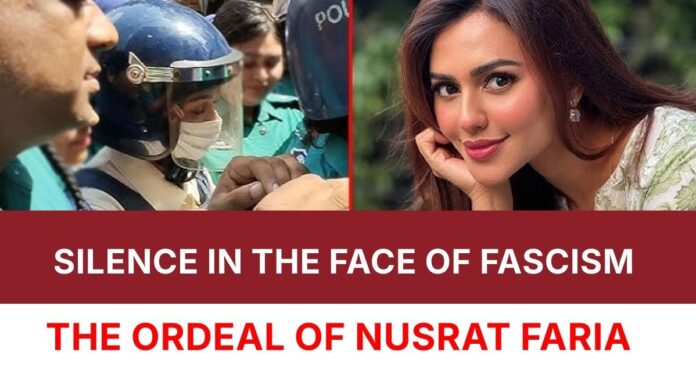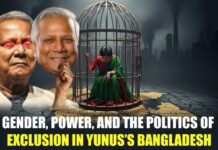Bangladesh stands at a critical crossroads, witnessing what many are calling the most aggressive manifestation of authoritarian control in recent memory. At the heart of this political storm is actress and model Nusrat Faria, who now finds herself behind bars—not for any real crime, but for the role she chose to play in a film.
Faria’s “offense” is that she portrayed Prime Minister Sheikh Hasina in a cinematic production. For this act of artistic expression, she has been targeted, arrested in what many are calling a fabricated case, and produced in court. The judiciary, accused of functioning as a compliant extension of Nobel laureate Muhammad Yunus’s political machinery, has set her bail and remand hearing for May 22.
What crime did Nusrat Faria commit? Is it now a criminal act in Bangladesh to take on a character in a film? Her arrest raises urgent questions not just about freedom of expression, but also about the rule of law and the weaponization of the judiciary to settle political or personal scores.
More troubling, however, is the deafening silence that surrounds this injustice.
The foreign embassies in Dhaka, usually vocal about human rights and democratic values, have so far chosen silence. The civil society, often the conscience of a nation, appears muted. Cultural activists, who should be the first to defend artistic freedom, remain disturbingly absent from the conversation.
Why this silence? Why this complicity?
The arrest of Nusrat Faria is not just an attack on one individual—it is an assault on the very idea of free expression in Bangladesh. If portraying a political figure on screen is enough to land someone in jail, what message does that send to the country’s artists, writers, and filmmakers?
In any functioning democracy, justice must not be selective, and freedom of speech must not be conditional. The international community, human rights organizations, and the people of Bangladesh must ask: Who will hold the perpetrators of this injustice accountable?
If this moment passes unchallenged, the space for dissent and creativity in Bangladesh will shrink even further. And the question will not be whether someone like Nusrat Faria will be targeted next, but who.




